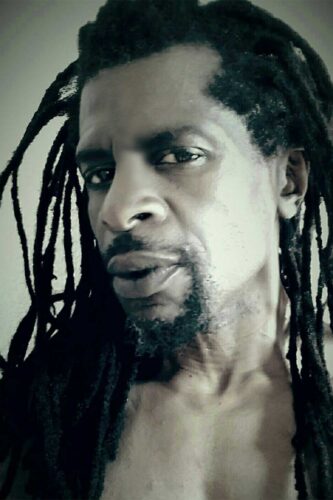
“A story of coming out Black, gay and sissy in New York with a father who thought he could beat the sissy out of him.”
That’s how Carol Dennis, a co-founder of Minority Voices Theatre, explained the premise of Eden Omari’s God Is Unavailable to me before the show. MVT is a partner of Very Little Theatre, and strives to bring diversity and visibility to Eugene’s oppressed voices through performing arts.
While MVT usually produces staged readings of plays, God is Unavailable, which ran in July, is a fully produced, full-length, one man show with 75 tech cues, and was their most technically challenging and complicated production to date, Dennis says.
Dennis, along with co-founder Stanley Coleman, first met Omari through one of the staged readings. Coleman says he was “blown away” with “how bright he was, how energetic he was, how determined he was.”
When Omari told the duo he had an autobiographical one man show that he had been developing and workshopping for several years, they jumped at the opportunity to produce it for him.
Coleman explains that this show, as well MVT, is not about “being a good ally,” but rather, “letting the audience in on the difficulties of being different.”
So, I went into the Saturday, July 28, matinee, knowing that it explored child abuse, violent homophobia and AIDS, and I was ready for a bleak 90 minutes that would spare no expense at letting me in on these difficulties.
What I watched instead was an enchanting performance that I can only describe as “sparkling.” Omari was charming, witty and always alluring. After a recorded introduction that notes “No names have been changed, as no one is innocent from the shenanigans that Eden will describe,” followed immediately by Omari miming getting slapped by his father, I knew I wasn’t in for a typical theatrical experience.
It opens with Omari walking out in masculine street clothes; baggy pants, oversized hoodie and the like. With a slouch and a growl, he explains that he occasionally acts and dresses this way to make his family and peers more comfortable.
He then exits the stage and returns dressed as an effeminate little boy — a flashback — and praying to God that his dad wouldn’t catch him sneaking out of the house, before miming the world’s best double-dutch, knowing he is about to get the grounding of a lifetime (because God didn’t listen).
As a 68-year-old man, this swift transition had all of the potential to come off as awkward and even embarrassing if not done perfectly. Yet Omari performed the scene with so much charm and charisma that the audience was in stitches — and they continued to be throughout the show.
While some scenes lasted a tad too long, and a few crossed the line between captivating and corny, they were written and performed with such feeling that they were saved because they were so clearly genuine and not contrived.
Omari mastered the art of “show, don’t tell.” He develops a relationship with the audience, sometimes through the profundity of a monologue that offers us a looking glass into his life and asks us to reflect upon ours, and other times through the simplicity of just chatting with us.
Yet he also knew when to let certain moments speak for themselves, and doing so was visually stunning. He doesn’t really tell us he was once a fixture of the ’80s black New York nightclub drag queen scene. Instead, he shows us by putting on a hilariously glamorous three song interactive drag show. At another point, he dances to tribal music and waves his very long dreadlocks in a mesmerizing and beautiful display, paying homage to his ancestors.
Omari showed no shortage of the difficulties of being a queer person of color during a particular time. His monologue about losing every single one of his friends to the AIDS crisis was utterly heartbreaking, while the development of his relationship with his father throughout the play was gut-wrenching.
In one of the last scenes, Omari tells us the moral of his story, playing the character of a kindly old woman in his church gospel choir giving him (and the audience) advice: When God is unavailable, He’s giving you the chance to use the tools He gave you.
God is Unavailable was emotional, personal, and absolutely showed the “difficulties of being different.” But it wasn’t bleak by any means. It was a glittering story full of life, and about hope.
This play kicked off Minority Voices Theatre’s Summer of Pride, which consists of three July and August Very Little Theatre productions relating to LGBTQ+ pride. These next shows are The Education of X and Confessions of an Aging Twink, two one-act plays that will be performed back to back on August 17 and 18.
Education of X is written and performed by Peter Almeida and is his musical telling of growing up gay and Catholic. Confessions of Aging Twink is written and performed by Daniel Borson, also known as Pippin, as he chronicles his journey of growing up gay and Jewish in Beverly Hills before becoming a queer burlesque performer in Eugene.